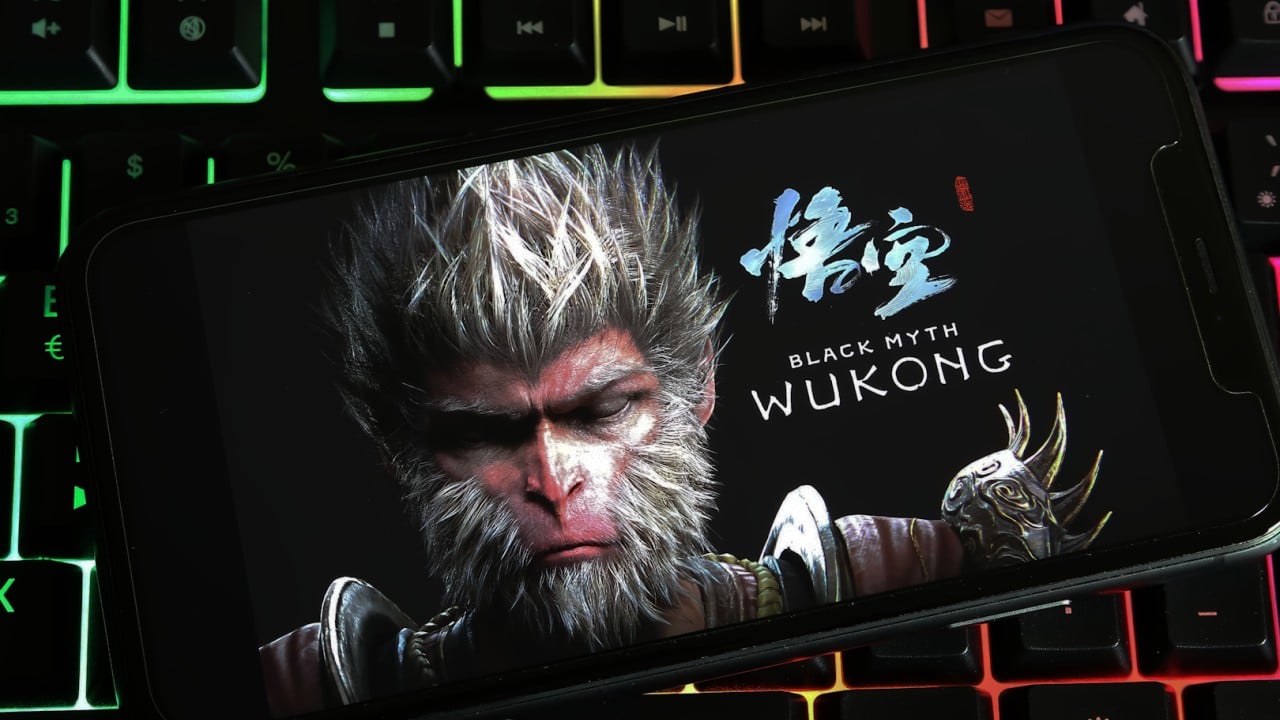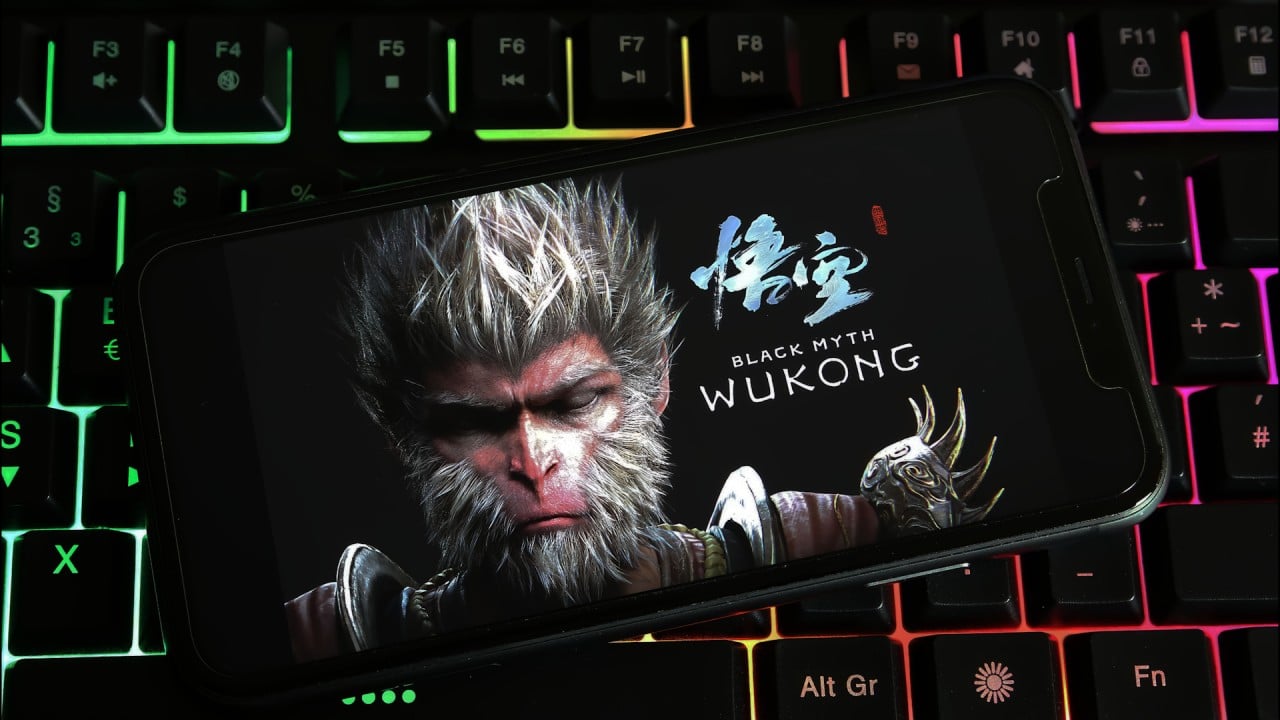Chinese-made action game Black Myth: Wukong has taken the world by storm, clocking up more than 2.2 million concurrent users as it debuted on Tuesday.
The sprawling 3D role-playing game became the second most popular “sandbox” distributed by US platform Steam within hours, trailing only PUBG, the 2017 shooter game that peaked at 3.2 million.
Analysts said the runaway success of the game – based on the eponymous Monkey King character from the 16th-century Chinese novel Journey to the West – showed how China’s creative workers could shore up cultural confidence.
It also highlighted an alternative way to take forward China’s often “heavily assailed soft power agenda”, one observer said.
Data shared by industry trackers VG Insights showed the game had sold 10 million units by Saturday evening in China, with 3 million concurrent players across all platforms.
Asked whether a gamified Wukong could be considered to be an “ambassador” for China, foreign ministry spokeswoman Mao Ning said on Wednesday that a game seemingly inspired by the Chinese classic spoke “to the appeal of Chinese culture”.
However, she did not address whether this indicated any potential “diplomatic gains”.
According to Gejun Huang, assistant professor of media and communications at the Xian Jiaotong-Liverpool University, the triple-A premium game was a good soft power vessel offering “immense potential”.
“A new face of Journey to the West indicates elevated levels of cultural creativity and innovation, [which are] often the heavily assailed aspects of China’s soft power agenda,” said Huang, whose specialities are the gaming industry, cultural policy and media entrepreneurship.
Huang said the explosive and positive reactions towards the game embodied China’s championing of techno-nationalism – or the use of technology to project global influence, and complemented its existing cultural endeavours.
However, creating a cultural export was not the core aim of Game Science, the low profile studio behind Wukong, according to its founding CEO Feng Ji, a former game designer at multimedia giant Tencent Holdings.
“I believe good cultural or content products should first naturally resonate with local cultural groups similar to the creators,” Feng told state news agency Xinhua. “If the quality is high enough and it endures for a sufficient period, it will naturally radiate to the overseas market we are talking about.”
“Ideally, this game’s contingent global popularity could attest to the enhanced persuasiveness of soft power discourses and legitimise a new way of delivering such discourses to broader global audiences,” Huang added.
In an interview with state-backed newspaper Global Times, Game Science’s artistic director Yang Qi said his team travelled across the country to research ancient architecture, including relics, temples, pagodas and stone carvings before reproducing them for the video game, which he described as a “digital archive” of the cultural heritage.
“Certainly, this game will direct public attention to these real-life monuments, especially for the younger generations who often align their cultural identities with guochao,” said Huang, referring to the “China chic” trend of embracing fashionable home-grown brands and cultures.
“On the other hand, there is a lack of evidence in China that featuring cultural heritage in games will boost players’ offline visits and related consumption.”
According to Sheng Zou, who teaches media at the Hong Kong Baptist University, discussions on the diplomatic potential of a cultural product needed to centre on a “more expansive notion of soft power”.
“Much of the discussion on soft power tends to focus on the nation-states as major actors, but in cases such as Wukong, corporate or non-state actors are the driving force,” Zou said.
According to Zou, China’s media and entertainment sector has seen many corporate-led globalisation efforts as Beijing seeks a more influential role in world media and culture.

“It fits in well with the state’s initiative in boosting its international communication, exemplified by the various ‘going out’ strategies in the media and cultural scene. Domestically, it also helps to shore up a sense of cultural confidence,” he said.
Beijing’s “going out” policy, introduced in 2000, encourages its enterprises to invest overseas and increase foreign direct investment.
“Non-state actors that operate on a market logic may have a better chance at winning people’s hearts and minds because their cultural influence is more subtle and appealing than things that are more overtly ideological or propagandistic,” Zou said.
Chinese web novels had attracted large global followings, he noted, with companies such as Dreame and iReader making a name for themselves within China and beyond.
Also, Singer 2024, the hit TV show with top-tier performers from China and abroad taking part in weekly sing-offs, has also made noise beyond the borders and been hailed by internet users as well as state-owned media as a global cultural platform.
According to Zou, although Black Myth: Wukong had the potential to inspire more positive impressions of China among a global audience, the change will be “subtle and gradual at best”.
Some users might just enjoy the game for reasons other than its Chinese cultural elements, he said, such as the gameplay, mechanics and player experience involved.



